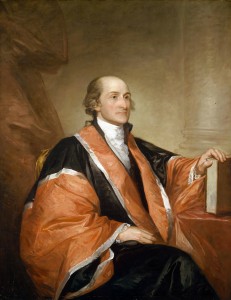Today we continue our series examining our Founding Fathers in their own words and considering their high esteem for religion, religious liberty, and virtue.
In light of today being the anniversary of the September 11 terrorist attacks on the World Trade Center and Pentagon, today’s post deals with the concept of ‘just war’ doctrine. Below is an excerpt from a letter written by John Jay, Founding Father and first Chief Justice of the Supreme Court, to John Murray. The letter is dated April 15, 1818, and discusses much related to Christian scripture and theology.


“The gospel appears to me to consider the servants of Christ as having two capacities or characters, with correspondent duties to sustain and fulfil.
“Being subjects of his spiritual kingdom, they are bound in that capacity to fight, pursuant to his orders, with spiritual weapons, against his and their spiritual enemies.
“Being also subjects and partakers in the rights and interests of a temporal or worldly state or kingdom, they are in that capacity bound, whenever lawfully required, to fight with weapons in just and necessary war, against the worldly enemies of that state or kingdom.
“Another view may be taken of the subject. The depravity which mankind inherited from their first parents, introduced wickedness into the world. That wickedness rendered human government necessary to restrain the violence and injustice resulting from it. To facilitate the establishment and administration of government, the human race became, in the course of Providence, divided into separate and distinct nations. Every nation instituted a government, with authority and power to protect it against domestic and foreign aggressions. Each government provided for the internal peace and security of the nation, by laws for punishing their offending subjects. The law of all the nations prescribed the conduct which they were to observe towards each other, and allowed war to be waged by an innocent against an offending nation, when rendered just and necessary by unprovoked, atrocious, and unredressed injuries.
“Thus two kinds of justifiable warfare arose: one against domestic malefactors; the other against foreign aggressors. The first being regulated by the law of the land; the second by the law of nations; and both consistently with the moral law.”

